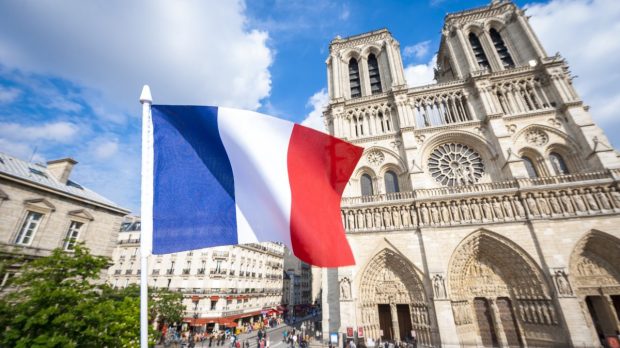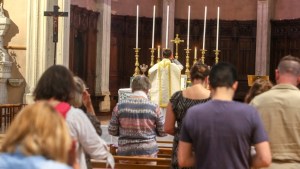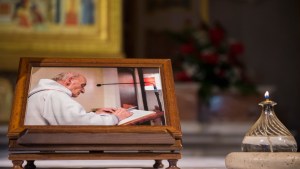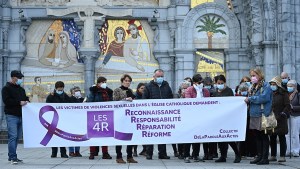As the French presidential election campaign comes down to the wire, President Emmanuel Macron and far-right candidate Marine Le Pen are engaged in an unexpectedly tight race, thanks in part to the Catholic vote, according to political observers.
While Macron won the first round of the election on April 10, with 27.8% of the vote, Le Pen came in second with 23.1% of the votes cast in her favor. That sent the election to a second round of voting, which will take place on Sunday.
The election is a rematch of the 2017 race, in which Macron beat Le Pen handily, winning over 66% of the vote.
While the latest polls show Macron’s lead over Le Pen increasing, this election promises to be a closer race than the last contest.
Catholic support for right-wing candidates
Catholic voters have shifted to the right politically since five years ago, according to a poll taken after the first round of the election on April 10.
The poll, commissioned by the Catholic newspaper La Croix after the first round of the election on April 10, found that over 42% of Catholics voted for candidates on the right wing of the political spectrum.
Here’s how self-described Catholics voted:
Macron, a centrist candidate, received 29% of the Catholic vote.
Le Pen, representing the far-right National Rally party (formerly the National Front), received 27% of the Catholic vote.
Eric Zemmour, a right-wing nationalist candidate, took 10% of the Catholic vote.
And Valérie Pécresse, a right-wing Republican, picked up 7% of the Catholic vote.
In the 2017 presidential election, the majority of French Catholics cast their votes for the Republican candidate, François Fillon. Only 12% of Catholics voted for Le Pen five years ago.
“This survey confirms once again that Catholics vote massively to the right, always more than the average of French society,” Philippe Portier, a former director of the religion sector at France’s National Center for Scientific Research (CNRS) told La Croix.
Le Pen’s success in this year’s election, indicates a further shift to the right among Catholic voters, according to Portier.
“There is a very clear evolution among Catholics who no longer hesitate to vote for the extreme right. A dam has broken,” he said.
Le Pen vs. Macron on the issues
Political analysts attribute Le Pen’s failure to win over voters in 2017 to her extremist positions and rhetoric, particularly on immigration, Islam, and “euro-skepticism.”
This time around she has turned her focus to France’s economy, as inflation and rising fuel prices have put the “cost of living” at the top of voters’ concerns. Her protectionist trade policies and support for expanding welfare benefits position her as a populist candidate, to the left of Macron. She has also changed her position on Europe, and no longer favors dropping out of the EU.
On certain issues, she remains to the far right of the incumbent. She favors a ban on the Muslim headscarf, and wants to favor native French people, and deny benefits and jobs to immigrants.
Macron, the centrist, pro-business candidate, has, for his part, shifted towards more protectionist rhetoric as well. He has campaigned in favor of more government intervention in assisting French industry. His proposal to raise the retirement age in order to reduce the country’s debt contrasts with Le Pen’s program of generous social welfare measures, which Macron has said is fiscally irresponsible.
The months-long “yellow vest” political protest of 2018 in response to Macron’s fuel tax hike, along with a somewhat authoritarian COVID-19 policy, may have left the incumbent president vulnerable to accusations of being oblivious to the concerns of regular voters.
Social issues have not made the headlines of late, but they still matter to some Catholic voters. The legalization of gay marriage in 2013, last year’s passage of a law allowing lesbians and single women access to in vitro fertilization, and the issue of surrogate motherhood may influence Catholics in the ballot box this year.
Guidance from Catholic bishops
With the field narrowed down to Macron and Le Pen, the French bishops released a statement urging voters to vote according to their consciences.
The statement spoke of “the importance of voting and of doing so in conscience, in the light of the Gospel and the Church’s social doctrine,” reported La Croix.
Without mentioning the names of the candidates, the statement went on to appeal “to the intelligence, conscience and freedom of each person.” The bishops stressed the “seriousness” of the election, and urged voters to consider, “the state of our country and the crises that the world is going through.”
An April 8 address by Archbishop Moulins de Beaufort, president of the French Bishop’s Conference, also emphasized the seriousness of the election.
“We will not elect a savior of France, nor a messiah, nor someone who should embody all the good to be done,” said the archbishop.
“We will have to choose a political leader, man or woman, who will have to lead our country in the always uncertain times in which humanity is advancing… He or she will have to lead us all, on the least bad path possible,” he said.
He said a nation “does not define itself by nostalgia for its past greatness,” nor “does it grow … by pretending to surround itself with walls.”
He also regretted that “the State and … our society (have) difficulty in welcoming and considering as brothers and sisters in humanity” migrants, “whether illegal or not,” and emphasized the Church’s opposition to the possible legalization of euthanasia.
In 2002, when Marine Le Pen’s father, Jean-Marie Le Pen, was running for president, the bishops issued a caution against succumbing to “instinct” and “fear” (the senior Le Pen was widely condemned for his anti-semitic remarks and denial of the Holocaust).
“In the period that is opening up, we must all appeal to intelligence rather than instinct, to discernment rather than mere spontaneity, to serenity rather than fear,” said then- Archbishop Jean-Pierre Ricard, who was CEF president at the time.




